世界气候变化Climate Change(温室效应Green House Effect)英文介绍
环境保护类英语词汇

环境保护类native species本地物种marine species海洋物种prevent flooding预防水灾enrich soil使土地肥沃disperse seeds散播种子support wildlife供养野生动物absorb pollutants吸收有害物质preserve soil保护土壤fight erosion防止腐蚀reduce runoff减少流失hold soil固土fallen leaves落叶remove dust除尘degradation气温living creatures生物ruin the environment破坏环境weather forecast天气预报climate change气候变化global warming全球变暖greenhouse effect温室效应finite resource有限资源deforestation砍伐森林desertification沙漠化on-the-spot fine当场处罚urban garbage城市垃圾litter乱扔垃圾population growth人口增长remedial measure补救性措施environmental protectior环境保护ecosystem生态系统air pollution空气污染carbon dioxide二氧化碳hazardous material有害物质be in short supply供应不足chemical pollutant化学污染物industrial waste工业废料global warming全球变暖ecosystem n.生态系统environmental protection环境保护sustainable development可持续发展greenhouse effect温室效应low carbon低碳discharge vt.排放contaminate v.污染deteriorate V.恶化lack vt.缺少green adj.环保的eco-friendly adj.环保的environmental-friendly adj.环保的degrade v.恶化、降级shortage n.缺乏eficiency n.缺乏、不足deplete natural resources 耗尽自然资源preserve vt.保护leave a carbon footprint 留下一个碳足迹toxic adj.有毒的environmental-friendly products环保产品sort the daily garbage 生活垃圾分consume less and recycle more 少消耗、多回收discharge/release pollutants into the environment 向环境排放污染物renewable energies可再生能源,fight climate change 抵制气候变化conserve energy 节约能源improve air quality改善空气质量fuel-efficient vehicles燃油高效汽车improve air quality改善空气质量filter air净化空气provide oxygen提供氧气lower air temperature降低气温vulnerable species濒危物种Habitat loss栖息地消失under threat of extinction濒临灭绝take practical actions采取实际行动Conservationists自然资源保护主义者conservation groups环境保护组织redress that balance恢复平衡offer dues to为...提供线索modern lifestyles现代的生活方式lined with trees成行的绿树flowering plants开花植物deflect the sunlight让阳光折射civil engineering土木工程关爱野生物种的农民absorb and store rainwater 吸收和储存雨水garbage classification垃圾分类water-saving habit节水的习惯distribution of water水的分布water conservation水资源保护water shortage水资源短缺unclear and impure浑浊不清drinking water饮用水acid rain酸雨exhaust gas废气nature reserve自然保护区public hazard公共危害a fire hazard火灾隐患flood水灾drought旱灾save energy节能at risk在危险中acute disease急性病be exhausted被耗尽make joint hand携手chemical plant化工厂fight against对抗ever-accelerated不断发展suffer a great deal from深受其害destroy the ozone layer破坏臭氧层environmental degradation环境恶化deterioration of the ecology 生态恶化sustainable development持续发展keep ecological balance保持生态平衡break the ecological balance 破坏生态平衡appeal to the government向政府呼吁encourage city -residents鼓励市民set up a foundation建立一笔基金punish severely by the law依法严惩bring about a lot of losses 造成巨大损失enhance the quality of life 提高生活质量pose a threat to health对健康构成潜在威胁extremely serious problem极其严重的问题。
温室效应thegreenhouseeffect演讲稿英

加强能源管理
建立健全的能源管理制度,加强 对能源消耗的监测和管理,及时
发现和解决能源浪费问题。
发展清洁能源的重要性
减少温室气体排放
清洁能源如太阳能、风能、水能等不会产生温室气体排放, 有助于减缓全球变暖趋势。
促进经济可持续发展
发展清洁能源产业有助于推动经济转型升级,创造更多就 业机会,实现经济可持续发展。
气候变化会对生态系统和生物 多样性产生深远影响,导致一 些物种灭绝,生态系统失衡。
03
温室效应的影响
对自然环境的影响
气候变暖
温室气体导致地球表面温度升高, 引发气候变化和极端天气事件。
海平面上升
海洋吸收热量并扩张,导致海平面 上升对沿海城市和岛屿构成威胁。
生物多样性减少
气候变化导致生物栖息地减少,对 全球生态系统造成破坏,导致物种 灭绝。
气候变化对全球经济、社会和生态失等。
发展中国家在应对气候变化方面面临资金、技术和能力建设的挑战,需要国际社会 的支持和帮助。
加强国际合作,共同应对气候变化
加强国际气候政策对话与协调,推动 各国在减排、适应、资金和技术等方 面形成共识和行动。
感谢您的观看
THANKS
温室效应 thegreenhouseeffect演讲
稿英
目录
• 引言 • 温室效应的科学原理 • 温室效应的影响 • 应对温室效应的挑战 • 国际合作与全球治理 • 结论与展望
01
引言
演讲主题和目的
主题
探讨温室效应对地球环境的影响 及应对措施。
目的
提高听众对温室效应的认识,呼 吁大家共同关注环境问题,采取 行动减缓温室效应。
贸易受阻
气候变化可能导致某些地 区资源短缺,影响全球贸 易。
四级英语作文环境词汇

Ⅰ环境:1 环境污染1)气候变化climate change温室效应green-house effect- 全球变暖global-warming热带雨林tropical rain forest 酸雨acid rain北极冰融arctic melting 雪融snow melt 臭氧层ozone layer2) 污染物pollutant; contaminant垃圾dust; waste; rubbish; garage 白色污染white pollution 消耗consume; deplete 用尽use up; exhaust 严重的severe; grave; grievous城市废物municipal wastes 一次性筷子disposable chopsticks 一次性饭盒disposable meal boxes 废电池used/waste batteries 易拉罐aluminium can; can塑料废物plastic wastes 塑料袋plastic sack; plastic bag医院废物hospital wastes 输液管perfusion rube 输液袋infusion bag 药袋medicine bag工业固体废物industrial solid wastes 有机污染物organic pollutants 废金属scrap metals3)污染源pollutant source工厂factory; plant 车间paper mill 污水sewage; effluent 海洋倾倒ocean dumping 排放discharge造纸厂workshop 废水liquid waste; 土壤盐碱化soil alkalization水泥厂cement factory 有毒物质toxic substances 有害气体harmful gas摩托车motorcycle 汽车automobile 噪音污染noise pollution 空气污染air pollution 废气排放exhaust emission2 环境保护environmental conservation; environmental friendliness1) 采取措施take measures; take steps; take actions2) 废物回收利用waste reclamation; waste recycling3) 污水处理sewage disposal 水的再利用water reuse 污水处理系统sewage disposal system4)废物处理waste disposal 材料再利用reuse of materials 处理场所disposal sites 废物焚烧incineration of waste 可循环产品recyclable product 可再生资源renewable resources5) 噪音治理noise abatement 隔音措施acoustic treatment 隔声acoustic insulation 植树造林forestation 滥砍滥伐deforestation 禁止滥砍滥伐cease to deforest6) 环保意识environmental awareness; environmental consciousness 生态系统ecosystem 可持续发展sustainable development 生态平衡ecological balance 增强/提高环保意识enhance/ raise/ elevate the environmental awareness7) 国家立法national legislation 法律法规laws and regulationsⅡ社会1 家庭1)青少年 teenagers; adolescents 青少年犯罪 youthful offender; juveniledelinquency 青少年犯 young-offender 青少年教育 adolescent education 青少年感化院 borstal 青少年心理学 juvenile psychology2) 妇女一个开明的社会 a progressive/ enlightened society 两性平等gender equality 机会均等equality of opportunity 性别歧视gender discrimination 家庭主妇 housewife 被家务所累 be tied down by household chores 母性本能maternal instinct 生育孩子child bearing 养育孩子child rearing 抚养 to foster; to bring up’ to raise3) 老年人孝顺 filial piety 赡养 support4) 和谐的家庭气氛 the harmonizing atmosphere of a family 归属感 a sense of belonging 温暖warmness 亲情family love 家庭成员间的感情纽带family bonds; family ties 对。
climate change话题
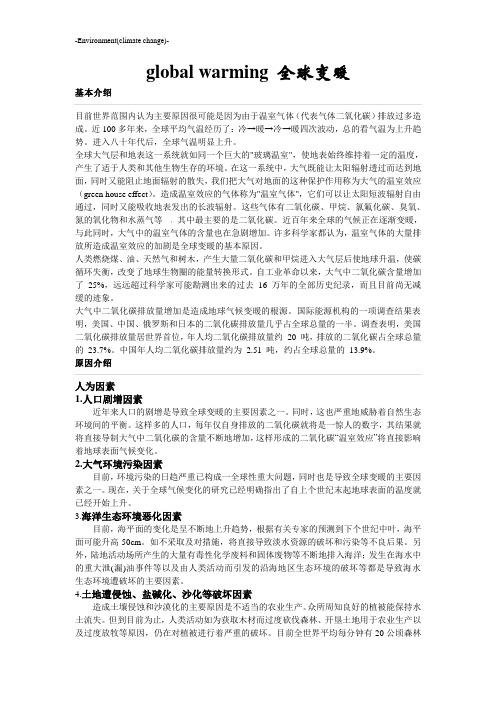
global warming 全球变暖基本介绍目前世界范围内认为主要原因很可能是因为由于温室气体(代表气体二氧化碳)排放过多造成。
近100多年来,全球平均气温经历了:冷→暖→冷→暖四次波动,总的看气温为上升趋势。
进入八十年代后,全球气温明显上升。
全球大气层和地表这一系统就如同一个巨大的"玻璃温室",使地表始终维持着一定的温度,产生了适于人类和其他生物生存的环境。
在这一系统中,大气既能让太阳辐射透过而达到地面,同时又能阻止地面辐射的散失,我们把大气对地面的这种保护作用称为大气的温室效应(green house effect)。
造成温室效应的气体称为"温室气体",它们可以让太阳短波辐射自由通过,同时又能吸收地表发出的长波辐射。
这些气体有二氧化碳、甲烷、氯氟化碳、臭氧、氮的氧化物和水蒸气等,其中最主要的是二氧化碳。
近百年来全球的气候正在逐渐变暖,与此同时,大气中的温室气体的含量也在急剧增加。
许多科学家都认为,温室气体的大量排放所造成温室效应的加剧是全球变暖的基本原因。
人类燃烧煤、油、天然气和树木,产生大量二氧化碳和甲烷进入大气层后使地球升温,使碳循环失衡,改变了地球生物圈的能量转换形式。
自工业革命以来,大气中二氧化碳含量增加了25%,远远超过科学家可能勘测出来的过去16 万年的全部历史纪录,而且目前尚无减缓的迹象。
大气中二氧化碳排放量增加是造成地球气候变暖的根源。
国际能源机构的一项调查结果表明,美国、中国、俄罗斯和日本的二氧化碳排放量几乎占全球总量的一半。
调查表明,美国二氧化碳排放量居世界首位,年人均二氧化碳排放量约20 吨,排放的二氧化碳占全球总量的23.7%。
中国年人均二氧化碳排放量约为 2.51 吨,约占全球总量的13.9%。
原因介绍人为因素1.人口剧增因素近年来人口的剧增是导致全球变暖的主要因素之一。
同时,这也严重地威胁着自然生态环境间的平衡。
这样多的人口,每年仅自身排放的二氧化碳就将是一惊人的数字,其结果就将直接导制大气中二氧化碳的含量不断地增加,这样形成的二氧化碳“温室效应”将直接影响着地球表面气候变化。
气候变化文献
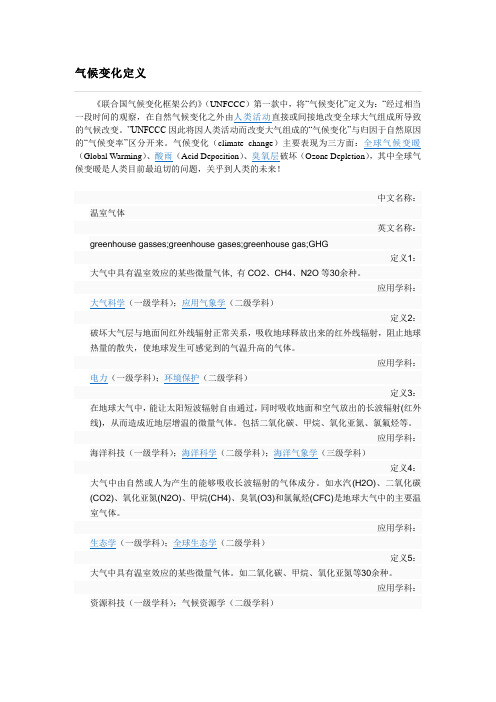
气候变化定义《联合国气候变化框架公约》(UNFCCC)第一款中,将“气候变化”定义为:“经过相当一段时间的观察,在自然气候变化之外由人类活动直接或间接地改变全球大气组成所导致的气候改变。
”UNFCCC因此将因人类活动而改变大气组成的“气候变化”与归因于自然原因的“气候变率”区分开来。
气候变化(climate change)主要表现为三方面:全球气候变暖(Global Warming)、酸雨(Acid Deposition)、臭氧层破坏(Ozone Depletion),其中全球气候变暖是人类目前最迫切的问题,关乎到人类的未来!中文名称:温室气体英文名称:greenhouse gasses;greenhouse gases;greenhouse gas;GHG定义1:大气中具有温室效应的某些微量气体, 有CO2、CH4、N2O等30余种。
应用学科:大气科学(一级学科);应用气象学(二级学科)定义2:破坏大气层与地面间红外线辐射正常关系,吸收地球释放出来的红外线辐射,阻止地球热量的散失,使地球发生可感觉到的气温升高的气体。
应用学科:电力(一级学科);环境保护(二级学科)定义3:在地球大气中,能让太阳短波辐射自由通过,同时吸收地面和空气放出的长波辐射(红外线),从而造成近地层增温的微量气体。
包括二氧化碳、甲烷、氧化亚氮、氯氟烃等。
应用学科:海洋科技(一级学科);海洋科学(二级学科);海洋气象学(三级学科)定义4:大气中由自然或人为产生的能够吸收长波辐射的气体成分。
如水汽(H2O)、二氧化碳(CO2)、氧化亚氮(N2O)、甲烷(CH4)、臭氧(O3)和氯氟烃(CFC)是地球大气中的主要温室气体。
应用学科:生态学(一级学科);全球生态学(二级学科)定义5:大气中具有温室效应的某些微量气体。
如二氧化碳、甲烷、氧化亚氮等30余种。
应用学科:资源科技(一级学科);气候资源学(二级学科)中国应对气候变化的政策与行动中华人民共和国国务院新闻办公室二○○八年十月·北京目录前言一、气候变化与中国国情二、气候变化对中国的影响三、应对气候变化的战略和目标四、减缓气候变化的政策与行动五、适应气候变化的政策与行动六、提高全社会应对气候变化意识七、加强气候变化领域国际合作八、应对气候变化的体制机制建设结束语前言全球气候变化及其不利影响是人类共同关心的问题。
[英语作文]Climate Change气候变化
![[英语作文]Climate Change气候变化](https://img.taocdn.com/s3/m/4e28f25bf68a6529647d27284b73f242326c3172.png)
[英语作文]Climate Change气候变化Title: The Urgent Reality of Climate ChangeClimate change, defined as the long-term alteration of the planet's weather patterns and average temperatures, has become one of the most pressing global issues of our time. The evidence is unequivocal: rising sea levels, more frequent extreme weather events, melting glaciers, and shifts in wildlife behavior are but a few indicators of the profound changes our Earth is experiencing. The scientific consensus points to human activities, particularly the emission of greenhouse gases from burning fossil fuels, as the primary drivers of these changes.One of the most visible impacts of climate change is the rise in global temperatures. This warming effect leads to a host of consequences, including more intense heatwaves that can threaten public health, reduce crop yields, and exacerbate water scarcity. Moreover, it contributes to the acceleration of ice cap melting, which in turn raises sea levels and endangers coastal communities.Another significant concern related to climate change is its potential to disrupt ecosystems. As temperatures rise, many species are forced to migrate to new habitats where they can find suitable living conditions. This migration can lead to ecological imbalances, with some species struggling to adapt and others proliferating at unprecedented rates. The resultant loss of biodiversity can have cascading effects on food chains and the services ecosystems provide.Climate change also poses economic challenges. Natural disasters such as hurricanes, floods, and droughts, which have increased in frequency and intensity due to changing climate conditions, result in massive financial losses. These events not only cause immediate damage but also hinder long-term economic development by affecting trade routes, infrastructure, and resource availability.Furthermore, climate change disproportionately affects vulnerable populations, particularly those in low-lying regions, arid areas, or developing countries with limited resources to cope with its impacts. Food security is a major issue, as climate variability can lead to crop failures and increased prices, exacerbating poverty and hunger.In response to the urgent reality of climate change, international cooperation has been crucial. The Paris Agreement, signed by nearly all United Nations member states, aims to limit global warming to well below 2 degrees Celsius above pre-industrial levels and pursue efforts to keep the increase to1.5 degrees Celsius. Meeting these targets requires collective action on two fronts: mitigation, which involves reducing greenhouse gas emissions, and adaptation, which focuses on preparing for and responding to the inevitable impacts of climate change.Individual actions, such as reducing energy consumption, using renewable energy sources, minimizing waste, and supporting sustainable agriculture, while important, are not enough. Systemic changes are necessary, including transitioning to green economies and investing in clean technologies. Furthermore, education and awareness campaigns are vital to ensure that everyone understands the gravity of the situation and their role in contributing to solutions.In conclusion, climate change is not an abstract concept but a tangible reality with far-reaching consequences for humanity and the natural world. It demands immediate and sustained attention from governments, businesses, and individuals alike. Only through a concerted global effort can we hope to safeguard our planet for future generations. The time for decisive action is now—the stakes could not be higher.。
备战2023年高考英语话题通关精准练词汇 阅读 写作08环境保护(含答案)

高考英语话题通关精准练词汇阅读写作:专题08环境保护—备战2023高考英语话题通关精准练(词汇+阅读+写作)一:话题词汇过关1.ecosystem n.生态系统2.habitat n.栖息地3.vegetation n.植被4.energy n.能源5.resource n.资源6.surroundings n.环境7.pollution n.污染8.rubbish n.垃圾9.extinct adj.灭绝的10.endangered adj.濒危的11.deforestation n.森林采伐ndslide n.山体滑坡13.damage vt.破坏14.recycle vt.回收利用15.reserve n.保护区16.alternative adj.可替代的17.popularize vt.普及18.protect vt.保护19.beatify vt.美化20.save vt.节省21.area n.地区,面积22.ocean n.海洋23.ancient adj.古代的24.forest n.森林25.mountain n.山脉26.grow vi.生长27.balance n.& vt.平衡28.maintain vt.维持29.irreplaceable adj.不可替代的30.protect vt.保护31.well-managed adj.管理有方的32.observe vt.遵守33.reduce vt.减少34.recycle vt.循环35.long-lasting adj.持久的36.harmony n.和谐37.harmonious adj.和谐的38.forecast vt.预报;预告39.fuel n.燃料40.irrigate v.灌溉41.steady adj.稳固的;平稳的42.endanger vt.危害,使遭危险43.fearsome adj.令人恐惧的44.development n.开发45.pollution n.污染46.damaging adj.破坏性的47.drop vi.下降48.awful adj.可怕的,糟糕的49.smelly adj.有臭味的50.extinct adj. 灭绝的51.extinction n. 灭绝52.phenomenon n. 现象53.conservation n. 保护;保存54.enormous/massive adj. 巨大的55.catastrophe n. 大灾难56.preserve vt.保护;保存;保留57.prevent vt.防止;预防58.recycle vt.回收;再循环59.reserve n.& v.储备;预定60.rubbish n.垃圾;废物61.ruin vt.毁坏62.burden v.(使)担负n.重担;负担63.meanwhile adv.同时64.poverty n. 贫穷65.emission n. 排放66.exposure n. 暴露;显露plicated/complex adj. 复杂的68.postpone vt.&vi. 推迟;延期69.dirty adj.脏的70.dust n.灰尘;尘土71.decline v.减少;下降;衰退;谢绝72.decrease v.减少;变小73.deliberately adv.蓄意地;审慎地74.dustbin n.垃圾箱75.threaten v.威胁76.litter vt.乱扔77.energy n.能源;能量78.resource n.资源二:话题短语表达过关seize the opportunity抓住机遇1.make policies制定政策2.take measures采取措施3.have an interview with采访4.carbon dioxide二氧化碳5.fossil fuel化石6.environmental problems环境问题7.greenhouse effect温室效应8.climate change气候变化9.set up regulations制定制度10.cut down砍倒;削减11.find the solution找到解决办法12.be thankful for对……心存感激13.at an unbelievable speed以令人难以置信的速度14.environmental protection环境保护15.have an impact on对……产生影响16.put...in danger置……于危险的境地17.large amounts of大量,许多18.draw one’s attention to 引起某人的注意19.play a major role起主导作用20.on the rise 在上升21.take the example of 例如22.advocate a low-carbon life 提倡低碳生活23.be faced with/face/come across/meet with all kinds of difficulties面对各种困难24.appeal to/call on people to make donations 呼吁人们捐赠25.be in danger of extinction/becoming extinct/dying out 处于灭绝的危险26.fight against pollution 与污染做斗争27.keep/break ecological balance 保持/破坏生态平衡28.environment-friendly products环保产品29.Only One Earth,Care and Share只有一个地球——一齐关心,共同分享30.sort the garbage 分类垃圾31.deal with rubbish properly正确处理垃圾32.make proper use of water resources 合理利用水资源33.raise the awareness of 提高……的意识三:话题句型练笔1:There is little doubt that Earth is getting warmer and warmer毫无疑问,地球正在变得越来越温暖2:Without this process,Earth could not sustain life.没有这个过程,地球就无法维持生命。
气候的英语名词解释
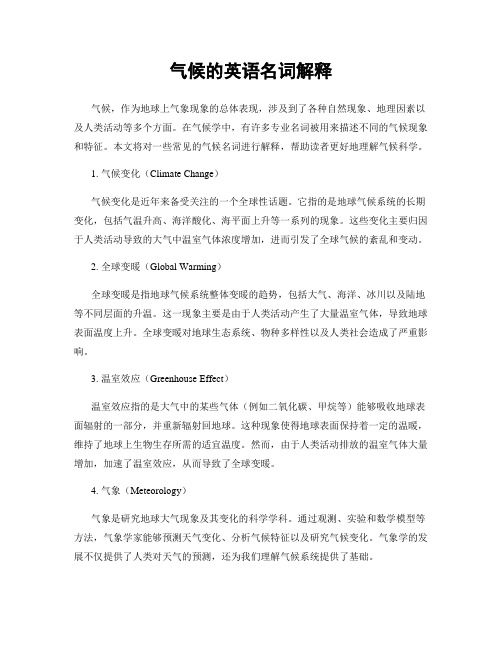
气候的英语名词解释气候,作为地球上气象现象的总体表现,涉及到了各种自然现象、地理因素以及人类活动等多个方面。
在气候学中,有许多专业名词被用来描述不同的气候现象和特征。
本文将对一些常见的气候名词进行解释,帮助读者更好地理解气候科学。
1. 气候变化(Climate Change)气候变化是近年来备受关注的一个全球性话题。
它指的是地球气候系统的长期变化,包括气温升高、海洋酸化、海平面上升等一系列的现象。
这些变化主要归因于人类活动导致的大气中温室气体浓度增加,进而引发了全球气候的紊乱和变动。
2. 全球变暖(Global Warming)全球变暖是指地球气候系统整体变暖的趋势,包括大气、海洋、冰川以及陆地等不同层面的升温。
这一现象主要是由于人类活动产生了大量温室气体,导致地球表面温度上升。
全球变暖对地球生态系统、物种多样性以及人类社会造成了严重影响。
3. 温室效应(Greenhouse Effect)温室效应指的是大气中的某些气体(例如二氧化碳、甲烷等)能够吸收地球表面辐射的一部分,并重新辐射回地球。
这种现象使得地球表面保持着一定的温暖,维持了地球上生物生存所需的适宜温度。
然而,由于人类活动排放的温室气体大量增加,加速了温室效应,从而导致了全球变暖。
4. 气象(Meteorology)气象是研究地球大气现象及其变化的科学学科。
通过观测、实验和数学模型等方法,气象学家能够预测天气变化、分析气候特征以及研究气候变化。
气象学的发展不仅提供了人类对天气的预测,还为我们理解气候系统提供了基础。
5. 气候系统(Climate System)气候系统是地球大气、海洋、陆地和冰雪等要素相互作用的复杂系统。
这一系统包括大规模的气候带和气候区域,以及与之相互作用的各种因素。
气候系统对于人类的生活和经济活动具有重要影响,同时也受到人类活动的干扰。
6. 湿度(Humidity)湿度是指空气中水蒸气含量的多少。
湿度的高低直接影响到气候的感觉和舒适度。
全球气候变化原因及对人类生存带来的影响
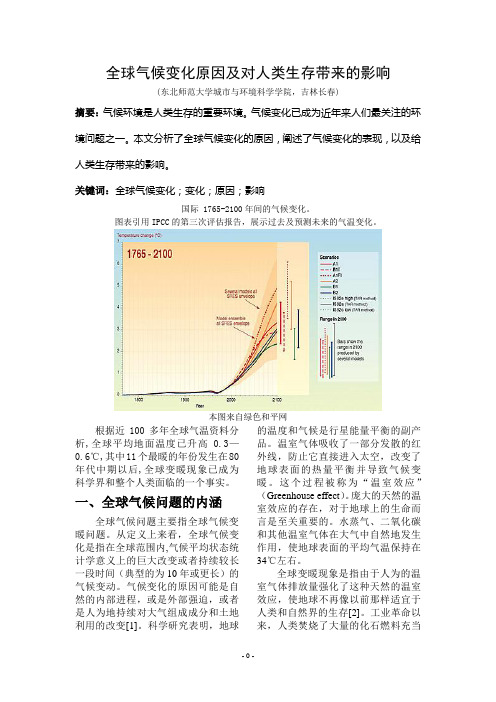
全球气候变化原因及对人类生存带来的影响(东北师范大学城市与环境科学学院,吉林长春)摘要:气候环境是人类生存的重要环境。
气候变化已成为近年来人们最关注的环境问题之一。
本文分析了全球气候变化的原因,阐述了气候变化的表现,以及给人类生存带来的影响。
关键词:全球气候变化;变化;原因;影响国际 1765-2100年间的气候变化。
图表引用IPCC的第三次评估报告,展示过去及预测未来的气温变化。
本图来自绿色和平网根据近100多年全球气温资料分析,全球平均地面温度已升高0.3—0.6℃,其中11个最暖的年份发生在80年代中期以后,全球变暖现象已成为科学界和整个人类面临的一个事实。
一、全球气候问题的内涵全球气候问题主要指全球气候变暖问题。
从定义上来看,全球气候变化是指在全球范围内,气候平均状态统计学意义上的巨大改变或者持续较长一段时间(典型的为10年或更长)的气候变动。
气候变化的原因可能是自然的内部进程,或是外部强迫,或者是人为地持续对大气组成成分和土地利用的改变[1]。
科学研究表明,地球的温度和气候是行星能量平衡的副产品。
温室气体吸收了一部分发散的红外线,防止它直接进入太空,改变了地球表面的热量平衡并导致气候变暖。
这个过程被称为“温室效应”(Greenhouse effect)。
庞大的天然的温室效应的存在,对于地球上的生命而言是至关重要的。
水蒸气、二氧化碳和其他温室气体在大气中自然地发生作用,使地球表面的平均气温保持在34℃左右。
全球变暖现象是指由于人为的温室气体排放量强化了这种天然的温室效应,使地球不再像以前那样适宜于人类和自然界的生存[2]。
工业革命以来,人类焚烧了大量的化石燃料充当能源,这些燃料以碳为主要构成,燃烧时氧化生成二氧化碳。
据统计,目前有超过3/4的净二氧化碳排放量来自化石燃料的燃烧。
因此,解决全球变暖问题从本质上等同于减少世界能源体系中的碳。
除去大气中人为的二氧化碳排放量,需要一个漫长的过程,而与此同时,二氧化碳的整体排放量有增无减,这使得大气中的二氧化碳浓度稳步升高。
世界气候变化Climate Change(温室效应Green House Effect)英文介绍PP
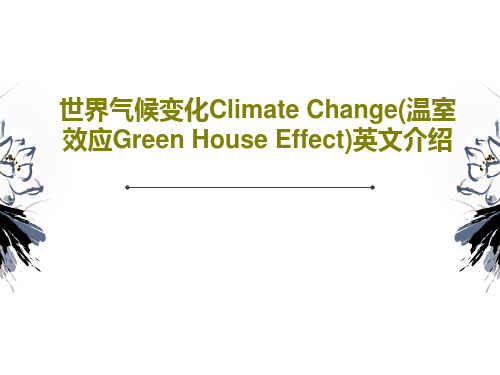
60、生活的道路一旦选定,就要勇敢地 走到底 ,决不 回头。 ——左
39、没有不老的誓言,没有不变的承 诺,踏 上旅途 ,义无 反顾。 40、对时间的价值没有没有深切认识 ห้องสมุดไป่ตู้人, 决不会 坚韧勤 勉。
56、书不仅是生活,而且是现在、过 去和未 来文化 生活的 源泉。 ——库 法耶夫 57、生命不可能有两次,但许多人连一 次也不 善于度 过。— —吕凯 特 58、问渠哪得清如许,为有源头活水来 。—— 朱熹 59、我的努力求学没有得到别的好处, 只不过 是愈来 愈发觉 自己的 无知。 ——笛 卡儿
世界气候变化Climate Change(温室 效应Green House Effect)英文介绍
36、“不可能”这个字(法语是一个字 ),只 在愚人 的字典 中找得 到。--拿 破仑。 37、不要生气要争气,不要看破要突 破,不 要嫉妒 要欣赏 ,不要 托延要 积极, 不要心 动要行 动。 38、勤奋,机会,乐观是成功的三要 素。(注 意:传 统观念 认为勤 奋和机 会是成 功的要 素,但 是经过 统计学 和成功 人士的 分析得 出,乐 观是成 功的第 三要素 。
Climate Change 全球气候变化 英语作文
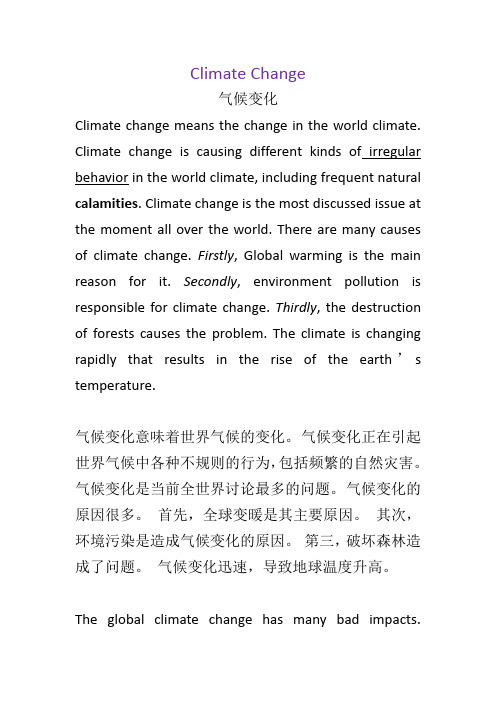
Climate Change气候变化Climate change means the change in the world climate. Climate change is causing different kinds of irregular behavior in the world climate, including frequent natural calamities. Climate change is the most discussed issue at the moment all over the world. There are many causes of climate change. Firstly, Global warming is the main reason for it. Secondly, environment pollution is responsible for climate change. Thirdly, the destruction of forests causes the problem. The climate is changing rapidly that results in the rise of the earth’s temperature.气候变化意味着世界气候的变化。
气候变化正在引起世界气候中各种不规则的行为,包括频繁的自然灾害。
气候变化是当前全世界讨论最多的问题。
气候变化的原因很多。
首先,全球变暖是其主要原因。
其次,环境污染是造成气候变化的原因。
第三,破坏森林造成了问题。
气候变化迅速,导致地球温度升高。
The global climate change has many bad impacts.Climate change causes a temperature rise, greenhouse and carbon dioxide gas emissions, erratic rainfall, salinity intrusion, the rise of floods, cyclones, drought, ice sheets melting which will seriously affect agriculture and livelihood, especially at the poor. Bangladesh is likely to be the most affected because of its geographical location. One-third of the total land of Bangladesh will go underwater if the sea level rises one meter. The developed nations, which are more responsible for such climate changes, should take responsibility to protect the victim countries. Now we can not stop changing the climate. We should be aware to reduce the bad impact of climate change. Tree plantation can reduce global warming which is the main reason for climate change. We should stop using harmful chemicals can reduce environmental pollution.全球气候变化具有许多不利影响。
英语词汇复习环境类

英语词汇复习环境类英语词汇复习——环境类环境意识的提升,日益引起人们的关注。
在环境问题日益严峻的今天,我们需要更多的英语词汇来描述和讨论与环境有关的话题。
本文将为大家提供一些常用的环境类英语词汇,并给出相应的例句和用法说明。
一、污染类词汇1. Pollution(污染)Pollution refers to the introduction of harmful substances or energy into the environment, causing negative effects on living organisms and their surroundings.Example: Air pollution is a major concern in urban areas.2. Contamination(污染)Contamination refers to the presence of unwanted or harmful substances in a particular environment.Example: The contamination of the river is threatening the life of aquatic species.3. Emission(排放)Emission refers to the release of pollutants or gases into the atmosphere, typically from industrial processes or vehicles.Example: Reducing carbon emissions is crucial for combating climate change.4. Waste(废物)Waste refers to any unwanted or useless materials, substances, or byproducts.Example: Recycling helps to reduce the amount of waste sent to landfills.5. Deforestation(森林砍伐)Deforestation refers to the clearing, removal, or destruction of trees in forests.Example: Deforestation leads to the loss of biodiversity and contributes to global warming.二、保护类词汇1. Conservation(保护)Conservation refers to the act of preserving, protecting, or managing natural resources and the environment.Example: Conservation organizations play a crucial role in protecting endangered species.2. Sustainability(可持续性)Sustainability refers to the ability to maintain or support something over the long term without causing harm to the environment.Example: The use of renewable energy is essential for achieving sustainability.3. Preservation(保护)Preservation refers to the protection and maintenance of natural resources or historical sites for future generations.Example: The preservation of ancient temples requires regular maintenance and restoration.4. Renewable(可再生的)Renewable refers to resources that can be replenished or replaced naturally within a relatively short period of time.Example: Solar and wind energy are examples of renewable energy sources.5. Eco-friendly(环保的)Eco-friendly refers to products or practices that do not harm the environment and are designed to have minimal impact on the planet.Example: Using reusable shopping bags is a simple way to be more eco-friendly.三、气候变化类词汇1. Climate change(气候变化)Climate change refers to long-term shifts in temperature, precipitation patterns, and other aspects of the Earth's climate system.Example: The consequences of climate change include rising sea levels and extreme weather events.2. Global warming(全球变暖)Global warming refers to the long-term increase in the Earth's average surface temperature due to human activities, primarily the burning of fossil fuels.Example: The melting of polar ice caps is a direct result of global warming.3. Greenhouse effect(温室效应)Greenhouse effect refers to the process by which certain gases trap heat in the atmosphere, leading to a rise in temperature on Earth.Example: Carbon dioxide is a major greenhouse gas that contributes to the greenhouse effect.4. Mitigation(减缓)Mitigation refers to actions taken to reduce or prevent the emission of greenhouse gases and alleviate the impact of climate change.Example: Planting trees is a form of mitigation as it helps absorb carbon dioxide from the atmosphere.5. Adaptation(适应)Adaptation refers to adjustments and changes made in response to the impacts of climate change to minimize vulnerability and maximize resilience.Example: Developing drought-resistant crops is an important adaptation strategy in regions prone to water scarcity.以上是一些常用的环境类英语词汇,希望能对您的英语词汇复习有所帮助。
帮我写一篇气候变化的原因英语作文
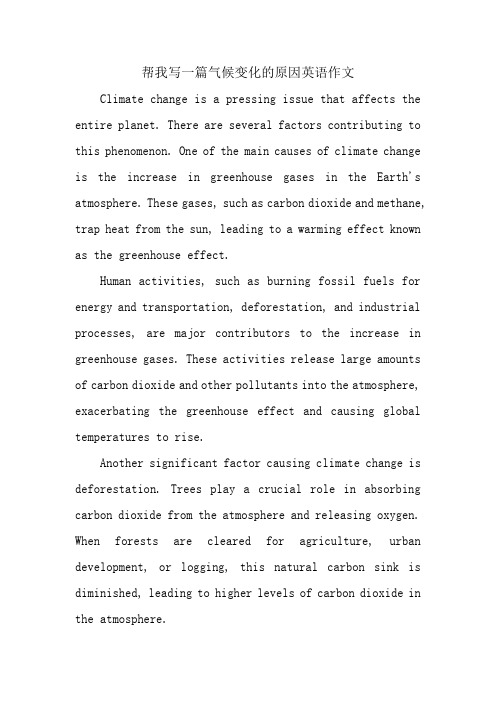
帮我写一篇气候变化的原因英语作文Climate change is a pressing issue that affects the entire planet. There are several factors contributing to this phenomenon. One of the main causes of climate change is the increase in greenhouse gases in the Earth's atmosphere. These gases, such as carbon dioxide and methane, trap heat from the sun, leading to a warming effect known as the greenhouse effect.Human activities, such as burning fossil fuels for energy and transportation, deforestation, and industrial processes, are major contributors to the increase in greenhouse gases. These activities release large amounts of carbon dioxide and other pollutants into the atmosphere, exacerbating the greenhouse effect and causing global temperatures to rise.Another significant factor causing climate change is deforestation. Trees play a crucial role in absorbing carbon dioxide from the atmosphere and releasing oxygen. When forests are cleared for agriculture, urban development, or logging, this natural carbon sink is diminished, leading to higher levels of carbon dioxide in the atmosphere.The consequences of climate change are far-reaching and include rising sea levels, more frequent and severe weather events, and disruptions to ecosystems and wildlife. Addressing the root causes of climate change and taking action to reduce greenhouse gas emissions are essential to mitigating its impact on our planet.中文翻译:气候变化是一个影响整个地球的紧迫问题。
最有名的六大科学热词有哪些
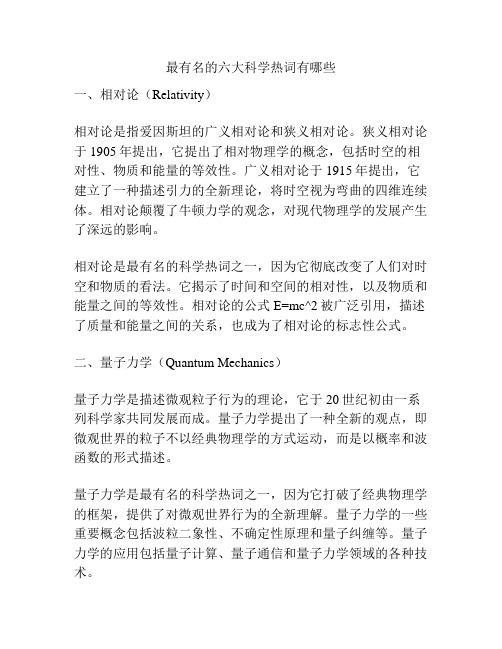
最有名的六大科学热词有哪些一、相对论(Relativity)相对论是指爱因斯坦的广义相对论和狭义相对论。
狭义相对论于1905年提出,它提出了相对物理学的概念,包括时空的相对性、物质和能量的等效性。
广义相对论于1915年提出,它建立了一种描述引力的全新理论,将时空视为弯曲的四维连续体。
相对论颠覆了牛顿力学的观念,对现代物理学的发展产生了深远的影响。
相对论是最有名的科学热词之一,因为它彻底改变了人们对时空和物质的看法。
它揭示了时间和空间的相对性,以及物质和能量之间的等效性。
相对论的公式E=mc^2被广泛引用,描述了质量和能量之间的关系,也成为了相对论的标志性公式。
二、量子力学(Quantum Mechanics)量子力学是描述微观粒子行为的理论,它于20世纪初由一系列科学家共同发展而成。
量子力学提出了一种全新的观点,即微观世界的粒子不以经典物理学的方式运动,而是以概率和波函数的形式描述。
量子力学是最有名的科学热词之一,因为它打破了经典物理学的框架,提供了对微观世界行为的全新理解。
量子力学的一些重要概念包括波粒二象性、不确定性原理和量子纠缠等。
量子力学的应用包括量子计算、量子通信和量子力学领域的各种技术。
三、基因组学(Genomics)基因组学是研究基因组的学科,包括基因的结构、功能、调控和进化等方面。
基因组学于20世纪末兴起,随着DNA测序技术的不断发展,人类基因组计划也于2001年完成了人类基因组的首次测序。
基因组学是最有名的科学热词之一,因为它成为了生物科学研究的重点领域之一。
基因组学的发展使得人们能够更好地理解基因在生物体中的作用,以及基因与环境的相互作用。
基因组学的应用包括基因治疗、人类起源研究和疾病研究等。
四、人工智能(Artificial Intelligence)人工智能是一门研究如何使计算机能够模拟和执行人类智能活动的学科。
人工智能于20世纪中叶开始兴起,随着计算机处理能力和算法的不断发展,人工智能的研究也取得了长足的进步。
生态翻译学下的英语新闻翻译分析

生态翻译学下的英语新闻翻译分析生态翻译学是一门涉及环境和生态主题的翻译学科。
在翻译环境和生态相关的新闻报道时,翻译人员需要了解并转达相关的科学知识和概念,同时还需要保持准确和效果的传达。
英语新闻报道中经常涉及到环境和生态问题,比如气候变化、环境保护、野生动物保护等。
翻译人员需要根据报道的内容和背景,选择合适的翻译方法和策略。
翻译人员需要理解和传达科学概念和术语。
对于关于气候变化的新闻报道,翻译人员需要了解并翻译相关的气候科学术语,如“气候变化”(climate change)、“温室效应”(greenhouse effect)、“全球变暖”(global warming)等。
他们应该查阅相关的科学文献和专业词典以确保翻译准确性。
翻译人员需要熟悉环境保护和生态问题的国际标准和政策。
对于涉及环境保护的新闻报道,翻译人员需要了解并传达相关的国际标准和政策,如《巴黎协定》(Paris Agreement)、《生物多样性公约》(Convention on Biological Diversity)等。
这些文件通常使用特定的术语和格式,需要翻译人员进行专门的学习和掌握。
翻译人员还应注意新闻报道的风格和语言特点。
新闻报道通常使用简练而生动的语言,目的是吸引读者的注意并传达信息。
翻译人员应尽量在翻译过程中保持相似的风格和语言特点,以充分传达原文的氛围和效果。
在进行环境和生态主题新闻翻译时,翻译人员还应注意文化因素。
环境问题和生态保护在不同的文化和国家中可能具有不同的重要性和解决方法。
翻译人员应根据目标读者的文化背景和需求,选择合适的表达方式和词汇,以确保翻译的有效传达。
生态翻译学下的英语新闻翻译需要翻译人员具备科学知识、专业术语的掌握,熟悉国际标准和政策,同时还要注意新闻报道的风格和语言特点,以及文化因素的考虑。
只有综合运用这些技巧和策略,翻译人员才能准确有效地传达环境和生态主题的新闻报道。
了解全球气候变化:原因、影响与应对策略

了解全球气候变化:原因、影响与应对策略1. Introduction1.1 OverviewGlobal climate change is one of the most pressing challenges facing our world today. It refers to long-term shifts in temperature and weather patterns, particularly due to human activities and natural factors. The increasing concentration of greenhouse gases (GHGs) in the atmosphere is considered the main cause of global climate change. These changes have far-reaching consequences for both the environment and human society.1.2 Article StructureThis article aims to provide a comprehensive understanding of global climate change by examining its causes, impacts, and potential solutions. It is divided into several sections for clarity and ease of navigation.In Section 2, we will discuss the primary reasons behind global climate change, including the emission of greenhouse gases, deforestation, and land use changes. Understanding these factors is crucial in developingeffective strategies to combat climate change.Section 3 focuses on exploring the various impacts of global climate change. From more frequent extreme weather events to rising sea levels and ecosystem collapse, these consequences have severe implications for human lives, biodiversity, and natural resources.In Section 4, we will delve into different strategies that can be adopted to mitigate and adapt to global climate change. This includes reducing GHG emissions through sustainable practices, promoting renewable energy sources, and fostering international cooperation for policy development.Finally, in Section 5, we will conclude by emphasizing the importance of addressing global climate change as a collective responsibility. We will highlight the significance of individual actions alongside collaborative efforts in tackling this urgent issue.1.3 PurposeThe purpose of this article is to educate readers about the complexities surrounding global climate change –from its underlying causes to its wide-ranging impacts on both nature and society. By presenting evidence-based information on effective mitigation and adaptationstrategies, it aims to encourage awareness and active participation from individuals and communities worldwide.By understanding these critical concepts outlined in this article, readers will be better equipped to contribute towards finding viable solutions and join the global efforts to combat climate change. Together, we can make a difference in preserving the planet for future generations.2. 全球气候变化的原因2.1 温室气体排放全球气候变化的主要原因是人类活动导致的温室气体的大规模排放。
温室效应和全球气候变化的概念机理优选演示

Carbon dioxide
二氧化碳是最重要的温室气体
来源
Methane
? 温室气体第二重要的是甲烷。
来源:主要来自化石燃料的使用、家畜饲 养、水稻种植和垃圾填埋
其他温室气体介绍
气体
氧化亚氮 nitrous
oxide
卤代烃 主要是CFCs 对流层臭氧
ozone
来源
人类活动、农业与土地利用、 家畜饲养和化学工业
温室效应和全球气候变化的概念机理
温室效应和全球气候变化的概念机理
全球气候变化:
Contents
1 温室效应的概念 2 温室效应的机理及各种温室气体 3 全球气候变化 4 影响及防护措施
一、概念
温室效应( greenhouse effect )
The greenhouse effect is a process by which thermal radiation from a planetary surface is absorbed by atmospheric greenhouse gases, and is re-radiated in all directions. Since part of this reradiation is back towards the surface, energy is transferred to the surface and the lower atmosphere. As a result, the temperature there is higher than it would be if direct heating by solar radiation were the only warming mechanism.
世界气候变化Climate Change(温室效应Green House Effect)英文介绍30
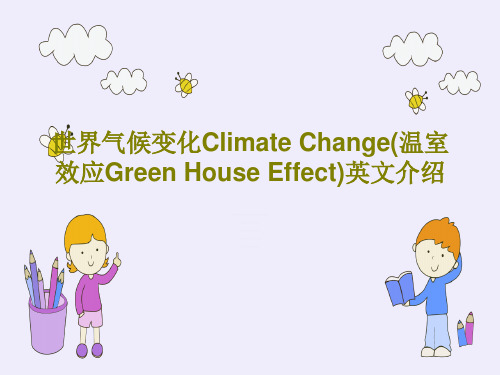
END
世界气候变化Climate Change(温室 效应Green House Effect)英文介绍
36、如果我们国家的法律中只有某种 神灵, 而不是 殚精竭 虑将神 灵揉进 宪法, 总体上 来说, 法律就 会更好 。—— 马克·吐 温 37、纲纪废弃之日,便是暴政兴起之 时。— —威·皮 物特
38、若是没有公众舆论的支持,法律 是丝毫 没有力 量的。 ——菲 力普斯 39、一个判例造出另一个判例,它们 迅速累 聚,进 而变成 法律。 ——朱 尼厄斯
40、人类法律,事物有规律,这是不 容忽视 的。— —爱献 生
16、业余生活要有意义,不要越轨。——华盛顿 17、一个人即使已登上顶峰,也仍要自强不息。——罗素·贝克 18、最大的挑战和突破在于用人,而用人最大的突破在于信任人。——马云 19、自己活着,就是为了使别人过得更美好。——雷锋 20、要掌握书,莫被书掌握;要为生而读,莫为读而生。——布尔沃
英文版全球气候变暖原因
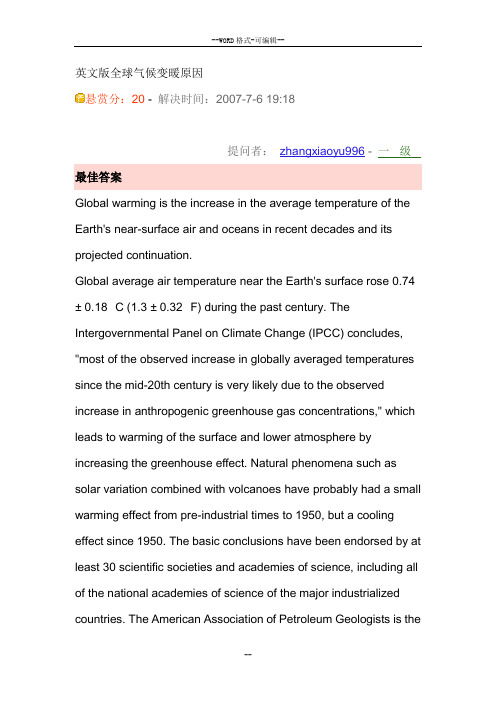
英文版全球气候变暖原因悬赏分:20 - 解决时间:2007-7-6 19:18提问者:zhangxiaoyu996 - 一级最佳答案Global warming is the increase in the average temperature of the Earth's near-surface air and oceans in recent decades and its projected continuation.Global average air temperature near the Earth's surface rose 0.74 ± 0.18 °C (1.3 ± 0.32 °F) during the past century. The Intergovernmental Panel on Climate Change (IPCC) concludes, "most of the observed increase in globally averaged temperatures since the mid-20th century is very likely due to the observed increase in anthropogenic greenhouse gas concentrations," which leads to warming of the surface and lower atmosphere by increasing the greenhouse effect. Natural phenomena such as solar variation combined with volcanoes have probably had a small warming effect from pre-industrial times to 1950, but a cooling effect since 1950. The basic conclusions have been endorsed by at least 30 scientific societies and academies of science, including all of the national academies of science of the major industrialized countries. The American Association of Petroleum Geologists is theonly scientific society that rejects these conclusions, and a few individual scientists also disagree with parts of them.Climate models referenced by the IPCC project that global surface temperatures are likely to increase by 1.1 to 6.4 °C (2.0 to 11.5 °F) between 1990 and 2100. The range of values reflects the use of differing scenarios of future greenhouse gas emissions and results of models with differences in climate sensitivity. Although most studies focus on the period up to 2100, warming and sea level rise are expected to continue for more than a millennium even if greenhouse gas levels are stabilized. This reflects the large heat capacity of the oceans.全球气候变暖用英文怎么说?悬赏分:0 - 解决时间:2006-6-27 00:19有没有相关的英文文章.谢谢提问者:鲍蔓薇- 三级最佳答案global warming 或者green house effect 温室效应,又译全球气候变暖The greenhouse effect is the rise in temperature that the Earth experiences because certain gases in the atmosphere (water vapor, carbon dioxide, nitrous oxide, and methane, for example) trap energy from the sun. Without these gases, heat would escape back into space and Earth’s average temperature would be about 60ºF colder. Because of how they warm our world, these gases are referred to as greenhouse gases.Have you ever seen a greenhouse? Most greenhouses look like a small glass house. Greenhouses are used to grow plants, especially in the winter. Greenhouses work by trapping heat from the sun. The glass panels of the greenhouse let in light but keep heat from escaping. This causes the greenhouse to heat up, much like the inside of a car parked in sunlight, and keeps the plants warm enough to live in the winter.The Earth’s atmosphere is all around us. I t is the air that we breathe. Greenhouse gases in the atmosphere behave much like the glass panes in a greenhouse. Sunlight enters the Earth's atmosphere, passing through the blanket of greenhouse gases. As it reaches the Earth's surface, land, water, and biosphere absorb the sunlight’s energy. Once absorbed, this energy is sent back into the atmosphere. Some of the energy passes back into space, but muchof it remains trapped in the atmosphere by the greenhouse gases, causing our world to heat up.The greenhouse effect is important. Without the greenhouse effect, the Earth would not be warm enough for humans to live. But if the greenhouse effect becomes stronger, it could make the Earth warmer than usual. Even a little extra warming may cause problems for humans, plants, and animals.联合国关于全球气候变暖的报道DATE=3/2/01TITLE=ENVIRONMENT REPORT - UN Climate Change Report BYLINE=Cynthia Kirk(Start at 59" )This is Bill White with the VOA Special English ENVIRONMENT REPORT.A new United Nations report says poor countries would (1)suffer the most from the effects of the warming of the Earth. The report says (2)shortages of food and water would affect some of the poorest parts of Africa, Asia and Latin America. These areas also would suffer an increase in diseases. The report says smallisland nations are most at (3)risk. However, it warns that (4)industrial countries would also be affected.The (5)Intergovernmental Panel on Climate Change released the report in Geneva, (6)Switzerland. Government representatives from one-hundred countries (7)approved the report.The findings were based on research from hundreds of scientists around the world. They examined how global warming will affect different areas of the world.The report (8)confirmed the increasingly strong evidence of the effect of human activities on the world’s (9)climate. It says burning (10)fossil fuels such as oil, gas and coal are mostly to(11)blame.These fuels release gases that trap heat in the atmosphere. An earlier report said global warming could cause the average temperature to increase almost six degrees Celsius during the next one-hundred years.Experts say global warming may cause sea levels in heavily populated coastal areas to rise. The most (12)widespread direct risk to people is from flooding and landslides. Experts say global warming may also cause an increase in diseases such as malaria. They also say many plants and animals may disappear as their (13)environments are destroyed.The report said poor countries are most at risk. However, it said rising sea levels in the United States may cause flooding and destruction of coastal areas. And it said melting ice caps in polar areas of the world may continue to change the climate for hundreds of years.Scientists have warned for years about the effects of global warming. But government experts say the new report is the first to show areas of the world most at risk. Environmental groups called for government action. The latest study is one of three reports dealing with climate change. The reports are part of U-N talks aimed at putting an international climate change (14)treaty into effect.Some experts, however, reject the Geneva report. They say there is no real scientific way to tell the full extent of global warming.This VOA Special English ENVIRONMENT REPORT was written by Cynthia Kirk.(1) suffer[ 5sQfE ]vt.遭受, 经历, 忍受vi.受痛苦, 受损害(2) shortage[ 5FC:tidV ]n.不足, 缺乏(3) risk[ risk ]vt.冒...的危险n.冒险, 风险(4) industrial[ in5dQstriEl ]adj.工业的, 产业的, 实业的, n.工业工人, [商]工业股票(5) intergovernmental[ 7intE^QvEn5mentEl ]adj.政府间的(6) Switzerland[ 5switsElEnd ]n.瑞士(欧洲中部国家)(7) approved[ E5pru:vd ]adj.经核准的, 被认可的(8) confirm[ kEn5fE:m ]vt.确定, 批准, 使巩固, 使有效v.确认, (基督教中)给...行按手礼(9) climate[ 5klaimit ]n.气候, 风土, 思潮(10) fossil[ 5fCsl ]n.化石, 僵化的事物adj.化石的, 陈腐的, 守旧的(11) blame[ bleim ]n.过失, 责备vt.责备, 谴责(12) widespread[5waIdspred, -5spred]adj.分布广泛的, 普遍的(13) environment[ in5vaiErEnmEnt ]n.环境, 外界(14) treaty[ 5tri:ti ]n.条约, 谈判双语:全球气候变暖将会导致更多的飓风出现_留学英语作者:佚名来源:不详发布时间:2007-10-26 15:26:41 发布人:lsy1chj2wdh3摘要:英国政府首席科学顾问戴维·金9月23日提出警告说,随着全球气候进一步变暖,飓风的危害程度和发生频率也将会呈日益加大之势。
- 1、下载文档前请自行甄别文档内容的完整性,平台不提供额外的编辑、内容补充、找答案等附加服务。
- 2、"仅部分预览"的文档,不可在线预览部分如存在完整性等问题,可反馈申请退款(可完整预览的文档不适用该条件!)。
- 3、如文档侵犯您的权益,请联系客服反馈,我们会尽快为您处理(人工客服工作时间:9:00-18:30)。
into space; the rest is absorbed by Earth’s system 3. Because of greenhouse gases in the atmosphere, only some of the sun’s energy is allowed to escape immediately—instead, the gases stay within the atmosphere, bouncing in all directions 4. The atmosphere is heated up as less and less gases are let out into space and more energy is absorbed by Earth
CO2 emissions Every ton of coal actually releases 2.86 tons of CO2—how is this possible?
Because coal is compressed carbon—when the carbon gets released,
Definitions according to
Global Warming process
1. The sun emits energy towards the Earth 2. The Earth reflects around 30% of the energy back
Process
Causes
What human-related causes are there? Deforestation Agriculture Fossil fuel burning Aerosol gases
Human-Related Causes
Deforestation The cutting of trees decreases the amount of CO2 that can be absorbed by plants for recycling Agriculture (fertilizer and manure) Overeating meat and incorrect diets of livestock create extra manure, releasing larger amounts of methane Fossil fuel burning (Coal, oil, natural gas, etc.) Exhaust from cars, trucks, other vehicles of transportation Power plants burning fossil fuels for electricity Emits CO2 and CO Aerosol gases Comes from spray cans (i.e. bug spray), dust, other particulates Gases block the sun’s light from being absorbed by the surface; instead, the particles absorb the light and keep it in the air (look at prior picture)
Definition
(n.): a change in global climate patterns apparent
from the mid to late 20th century onwards, attributed largely to the increased levels of atmospheric carbon dioxide produced by the use of fossil fuels. It is commonly known as “global warming”
they not only store CO2, but also release oxygen in to the atmosphere Trees hold water in roots; prevent soil erosion; harbor species
When destroyed, trees release stored CO2 into the air;
Fossil Fuel burning
When fossil fuels are burnt, they release CO2—why? Because fossil fuels are animals and plants, which store CO2 in their bodies; if you burn a live tree, it will release CO2 as well Burning fossil fuels for electricity accounts for around 37% of all
deforestation is responsible for about 20% of all CO2 emissions by humans It is estimated that more than 1.5 billion tons of CO2 are released into the atmosphere because of cutting and burning forests every year—burning being a two-fold polluter Over 30 million acres of forest are destroyed every year, mostly to plant crops to feed livestock, building houses, and firewood; about 50% of world’s tropical (i.e. Amazon) forests have been destroyed
it combines with the oxygen to form CO2
Coal is also the most dangerous fuel because it is carbon that is
stored in the ground for millions of years—when we release it, we are adding new carbon In the U.S., just under 50% of electricity comes from coal
Agriculture
In the U.S., 20% of CO2 emissions come from agriculture If we count all the fuel and oil needed to produce pesticides or
to use tractors and machinery, that number jumps to 25-30% of U.S. CO2 emissions The IPCC (Intergovernmental Panel on Climate Change) states that agriculture is responsible for around 12% of all CO2 emissions around the world Clearing forests (deforestation) for farmland Livestock increase methane emissions—account for about 85% of all methane emissions Genetically Modified Organisms (GMOs) are fed to the livestock instead of grass and grain, which disturbs the livestock’s digestive system; therefore, they release more gas
Deforestation
“Clear cutting”: cutting down a forest and removing all plants to
make a certain area “clear” of vegetation Forests are essential for life;
Contr. The most abundant greenhouse gas, but importantly, it acts as a
feedback to the climate. Water vapor increases as greenhouse gases do; therefore, more precipitation leads to even more precipitation and so on. Carbon dioxide (CO2). A minor but the most important component of the atmosphere, carbon dioxide is released through natural processes such as breathing and volcano eruptions and through human activities such as deforestation, land use changes, and burning fossil fuels. Humans have increased atmospheric CO2 concentration by a third since the Industrial Revolution began. Methane. (MH4) A natural and human created hydrocarbon gas cause by the decay of wastes in landfills, agriculture (especially rice cultivation), and manure from livestock. Much less abundant in the atmosphere, but more “powerful” than CO2. Nitrous oxide (N2O). A powerful greenhouse gas produced by soil cultivation practices, especially the use of commercial and organic fertilizers, fossil fuel combustion, nitric acid production, and biomass burning. Chlorofluorocarbons (CFCs). Synthetic compounds of industrial origin used in a number of applications. Emissions are regulated by international organizations because of their contribution to destroying the ozone layer.
